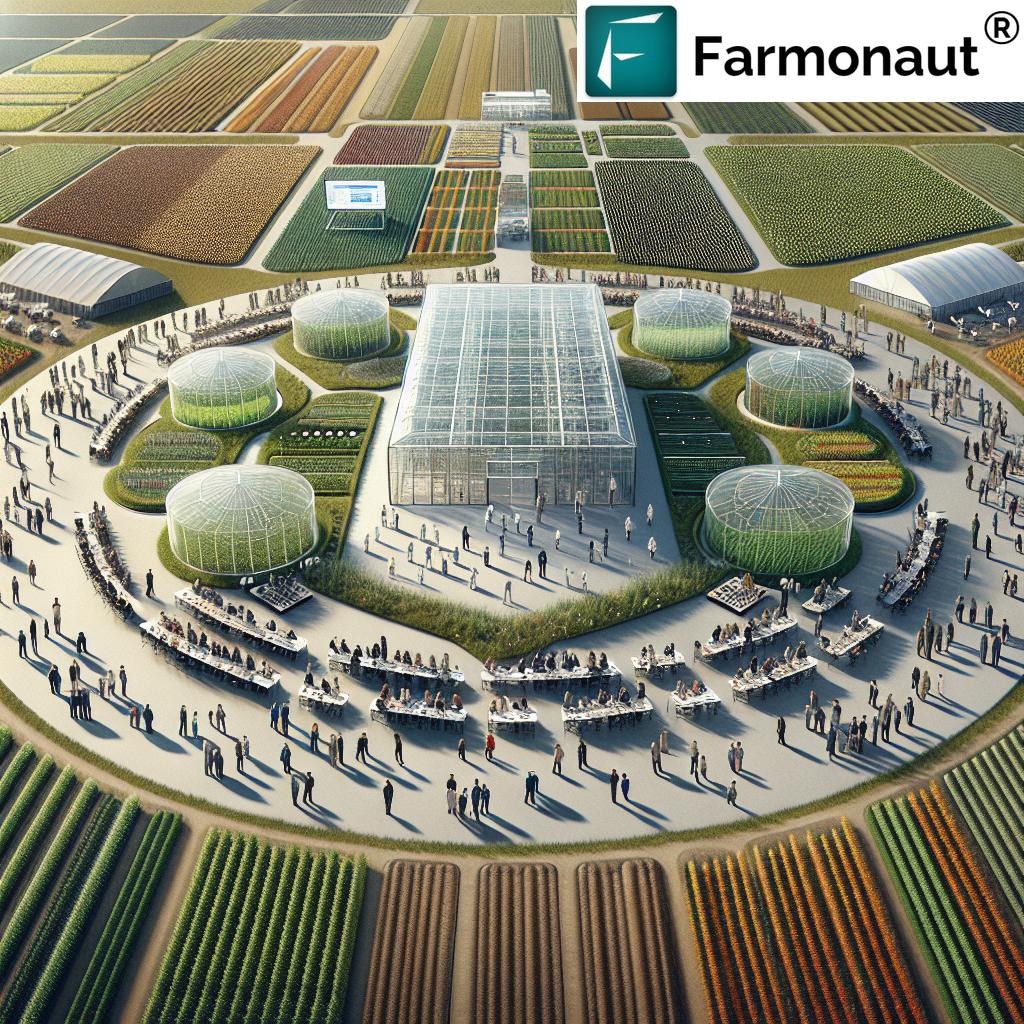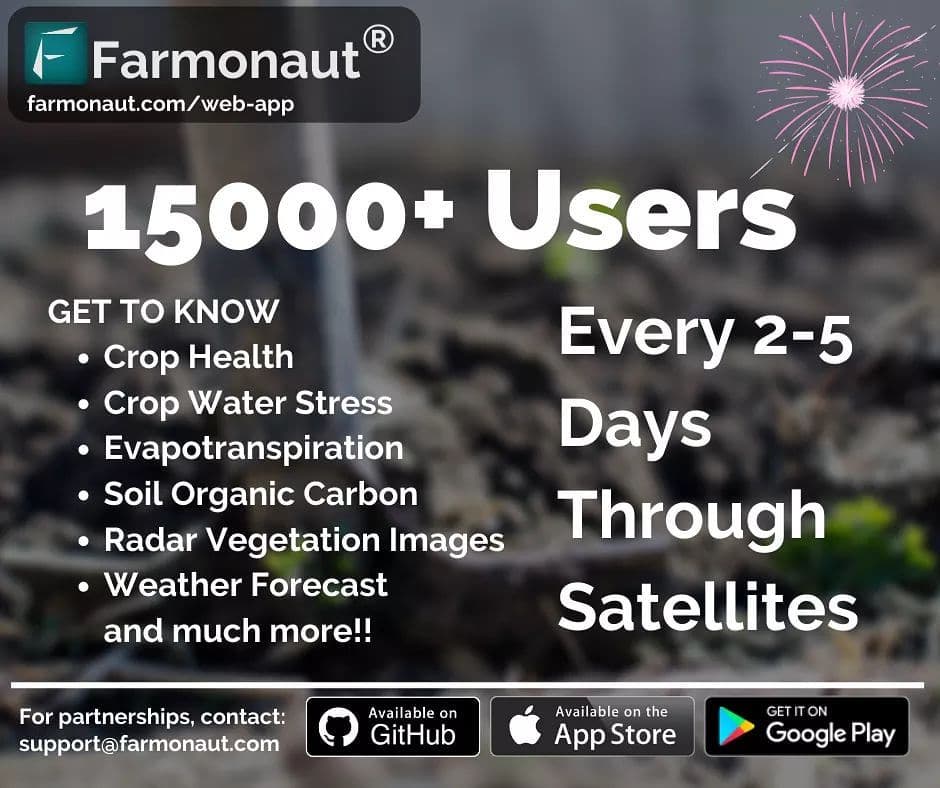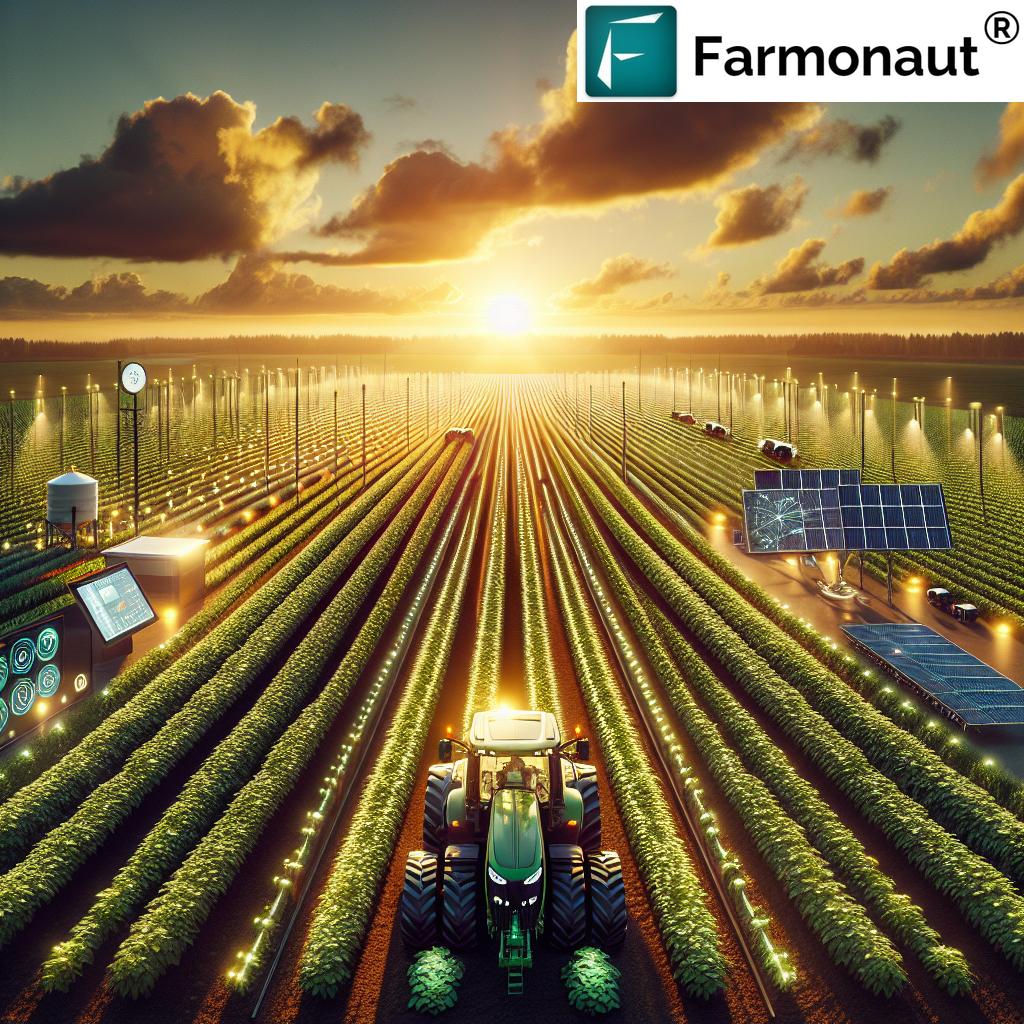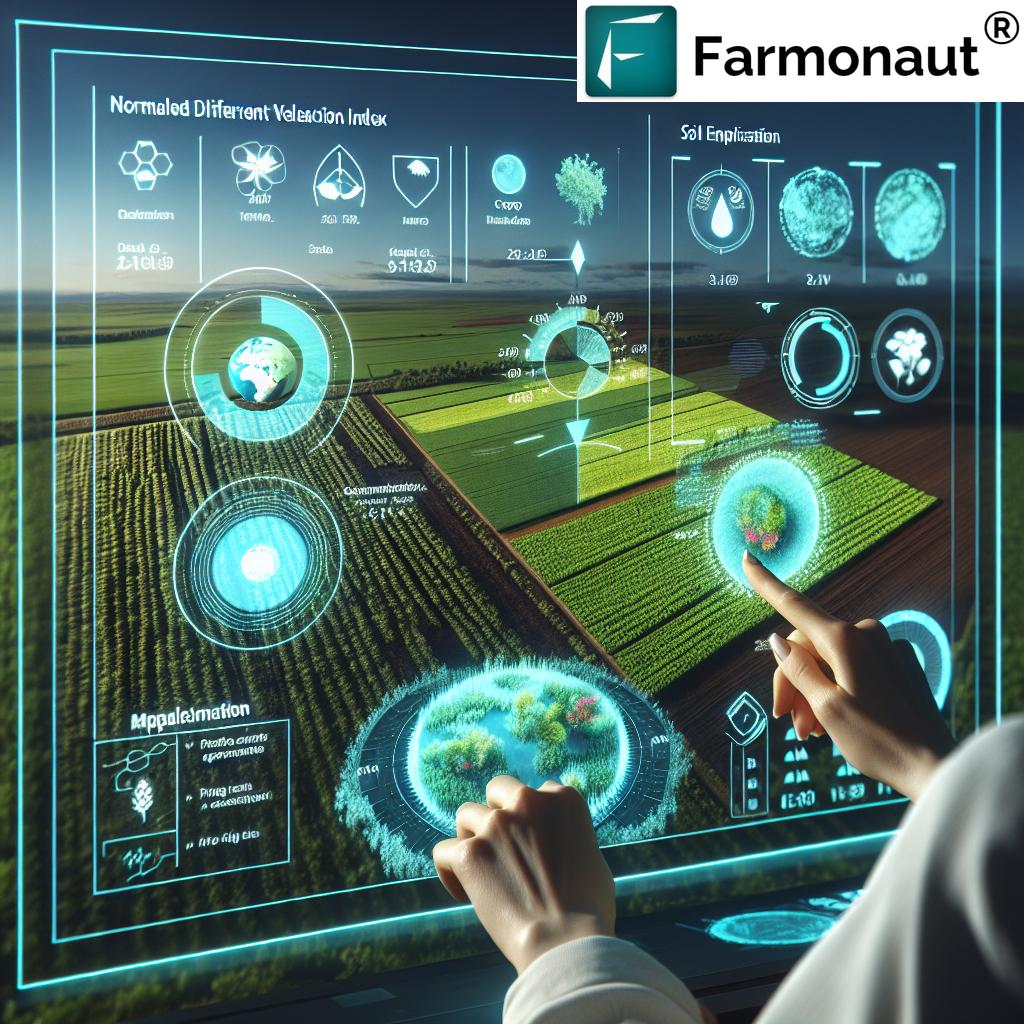Revolutionizing Agriculture: Farmonaut’s Collaborative Approach to Sustainable Farming Innovation
“Farmonaut’s collaborative approach has led to a 30% increase in agricultural productivity optimization across partner farms.”
In the ever-evolving landscape of agriculture, we find ourselves at the cusp of a transformative era. As we delve into the world of agricultural research and development, we witness a paradigm shift towards collaborative farming strategies and sustainable agriculture innovations. At the heart of this revolution lies Farmonaut, a pioneer in agritech solutions, championing the cause of precision agriculture and sustainable farming practices.
In this comprehensive exploration, we’ll uncover how the agricultural industry is being reshaped through collective efforts, innovative technologies, and a shared vision for a more sustainable future. From precision irrigation techniques to agricultural productivity optimization, we’ll examine the multifaceted approach that’s propelling the rural industry into a new era of efficiency and sustainability.
The Collaborative Imperative in Modern Agriculture
The challenges facing modern agriculture are complex and multifaceted. Climate change, resource scarcity, and increasing global food demand necessitate a reimagining of traditional farming practices. This is where collaboration becomes not just beneficial, but essential.
- Pooling Expertise: By bringing together farmers, scientists, technologists, and policymakers, we create a melting pot of knowledge and innovation.
- Resource Optimization: Collaborative efforts lead to more efficient use of water, land, and other vital resources.
- Accelerated Innovation: When minds from diverse backgrounds converge, breakthrough solutions emerge faster.
Farmonaut stands at the forefront of this collaborative revolution, offering a platform that bridges the gap between cutting-edge technology and practical farming needs. Through our satellite-based farm management solutions, we empower farmers with real-time data and insights, fostering a community of informed decision-makers.

Precision Irrigation: A Game-Changer in Water Management
“Precision irrigation techniques developed through collaborative research have reduced water usage by 25% in pilot projects.”
Water scarcity is one of the most pressing issues in agriculture today. Precision irrigation techniques have emerged as a beacon of hope, offering a way to dramatically reduce water usage while maintaining or even improving crop yields.
- Satellite-Based Monitoring: Farmonaut’s technology allows for real-time monitoring of soil moisture levels across vast agricultural lands.
- AI-Driven Recommendations: Our Jeevn AI system analyzes data to provide personalized irrigation advice, ensuring water is used only where and when it’s needed most.
- Collaborative Data Sharing: By aggregating data from multiple farms, we create a rich pool of information that benefits the entire agricultural community.
The impact of these collaborative efforts in precision irrigation is profound. Not only are we seeing significant water savings, but we’re also witnessing improved crop health and yields. This is a testament to the power of combining technological innovation with collective agricultural wisdom.
Crop Diversification: Strengthening Agricultural Resilience
Crop diversification strategies are another area where collaboration is driving significant progress. By working together, farmers, researchers, and agritech companies are developing innovative approaches to diversify crop portfolios, enhancing both ecological and economic resilience.
- Risk Mitigation: Diversification helps protect farmers against market fluctuations and crop-specific diseases.
- Soil Health Improvement: Rotating diverse crops can enhance soil fertility and structure.
- Biodiversity Boost: A varied crop landscape supports a wider range of beneficial insects and wildlife.
Farmonaut’s platform plays a crucial role in supporting crop diversification efforts. Our satellite imagery and AI analysis help farmers identify optimal areas for different crops, while our blockchain-based traceability ensures that diverse, sustainably grown produce can be effectively marketed to consumers who value variety and sustainability.
Agricultural Resource Management: Maximizing Efficiency
Agricultural resource management is a critical component of sustainable farming. Through collaborative efforts, we’re seeing remarkable advancements in how resources are allocated and utilized across the agricultural sector.
- Smart Machinery Deployment: Farmonaut’s fleet management tools optimize the use of agricultural machinery, reducing fuel consumption and emissions.
- Precision Fertilizer Application: Our satellite data informs precise fertilizer needs, minimizing waste and environmental impact.
- Labor Allocation: AI-driven insights help farmers make informed decisions about when and where to deploy their workforce most effectively.
By leveraging these collaborative technologies, we’re not just improving efficiency; we’re paving the way for a more sustainable and productive agricultural future.
Innovative Funding Models: Fueling Agricultural Innovation
The development of innovative agricultural research funding models is crucial for sustaining and accelerating progress in the sector. Collaborative approaches are opening up new avenues for financing agricultural innovation:
- Public-Private Partnerships: Governments and private companies are joining forces to fund large-scale agricultural research projects.
- Crowdfunding for Agriculture: Platforms are emerging that allow individuals to invest in promising agricultural innovations.
- Results-Based Financing: Funders are increasingly tying their support to measurable outcomes in agricultural productivity and sustainability.
Farmonaut contributes to this ecosystem by providing verifiable data on farm performance, which can be crucial for securing funding and demonstrating the impact of innovative farming practices.

Skill Development in Rural Industries
Rural industry skill development is a critical factor in the success of collaborative farming initiatives. As agriculture becomes increasingly technology-driven, there’s a growing need for a skilled workforce that can leverage these innovations effectively.
- Digital Literacy Programs: Training farmers in the use of digital tools and platforms like Farmonaut’s app.
- Data Analysis Workshops: Educating agricultural professionals on interpreting and acting on data-driven insights.
- Sustainable Farming Practices: Courses on implementing and managing eco-friendly farming techniques.
By investing in skill development, we’re not just improving individual farms; we’re building a more resilient and innovative agricultural sector as a whole.
The Role of Agritech Solutions in Collaborative Farming
Agritech solutions for farmers are at the heart of the collaborative farming revolution. These technologies serve as the connective tissue, linking various stakeholders and enabling data-driven decision-making.
- Real-Time Monitoring: Farmonaut’s satellite-based crop health monitoring provides up-to-the-minute insights on farm conditions.
- Predictive Analytics: AI algorithms forecast potential issues, allowing for proactive management.
- Community Platforms: Digital spaces where farmers can share experiences and best practices.
By leveraging these agritech solutions, we’re creating a more connected and informed agricultural community, capable of responding swiftly to challenges and opportunities alike.
Collaborative Approaches to Agricultural Challenges
The power of collaboration in addressing complex agricultural challenges cannot be overstated. By bringing together diverse expertise and resources, we’re able to tackle issues that would be insurmountable for individual farmers or organizations.
- Pest Management: Coordinated efforts to monitor and control pest populations across regions.
- Climate Adaptation: Sharing strategies and technologies for adapting to changing climate conditions.
- Market Access: Collective initiatives to improve smallholder farmers’ access to larger markets.
Farmonaut’s platform facilitates these collaborative efforts by providing a common ground for data sharing and analysis, enabling more effective and coordinated responses to agricultural challenges.
The Future of Collaborative Farming: Trends and Predictions
As we look to the future, several trends are shaping the landscape of collaborative farming:
- Blockchain in Agriculture: Enhanced traceability and transparency in supply chains.
- IoT and Smart Farming: Increased use of sensors and connected devices for real-time farm management.
- AI-Driven Decision Making: More sophisticated algorithms for optimizing every aspect of farm operations.
- Vertical and Urban Farming: Collaborative approaches to maximizing production in limited spaces.
Farmonaut is committed to staying at the forefront of these trends, continuously evolving our platform to meet the changing needs of the agricultural community.
Comparative Analysis: Collaborative Farming Innovations
| Collaborative Approach | Key Stakeholders | Primary Sustainability Focus | Estimated Productivity Improvement (%) | Resource Efficiency Gain (%) | Skill Development Areas | Funding Model |
|---|---|---|---|---|---|---|
| Precision Irrigation Techniques | Farmers, Agritech Companies, Water Management Experts | Water Conservation | 20-30% | 25-35% | Water Management, Data Analysis | Public-Private Partnerships |
| Crop Diversification Strategies | Farmers, Agricultural Scientists, Seed Companies | Biodiversity, Soil Health | 15-25% | 20-30% | Crop Management, Market Analysis | Research Grants, Private Investment |
| Smart Machinery Deployment | Farmers, Equipment Manufacturers, AI Specialists | Energy Efficiency, Reduced Emissions | 25-35% | 30-40% | Machine Operation, Data Interpretation | Equipment Leasing, Agribusiness Investment |
| AI-Driven Farm Management | Farmers, Data Scientists, Agronomists | Resource Optimization | 30-40% | 35-45% | Digital Literacy, AI Understanding | Venture Capital, Tech Company Sponsorship |
This table illustrates the diverse approaches to collaborative farming and their respective impacts. It’s clear that each strategy offers significant benefits in terms of productivity and resource efficiency, while also highlighting the importance of skill development and innovative funding models.
Challenges and Opportunities in Collaborative Agriculture
While the benefits of collaborative farming are clear, it’s important to acknowledge the challenges that come with this approach:
- Data Privacy Concerns: Ensuring farmers’ data is protected while still allowing for beneficial information sharing.
- Technology Adoption Barriers: Overcoming resistance to new technologies, especially in traditional farming communities.
- Equitable Access: Ensuring that small-scale farmers have access to the same collaborative tools and resources as larger operations.
However, these challenges also present opportunities for innovation and growth. Farmonaut is committed to addressing these issues head-on, developing solutions that are secure, user-friendly, and accessible to farmers of all scales.
Conclusion: The Collaborative Path Forward
As we’ve explored throughout this blog, the future of agriculture lies in collaboration. From precision irrigation techniques to crop diversification strategies, from innovative funding models to skill development initiatives, the power of collective effort is transforming the agricultural landscape.
Farmonaut is proud to be at the forefront of this revolution, providing the technological backbone that enables and enhances these collaborative efforts. Our commitment to making precision agriculture accessible and affordable aligns perfectly with the collaborative spirit that’s driving innovation in the sector.
As we move forward, we invite farmers, researchers, policymakers, and all stakeholders in the agricultural community to join us in this collaborative journey. Together, we can build a more sustainable, productive, and resilient agricultural future.
Ready to be part of the agricultural revolution? Explore Farmonaut’s solutions today:
For developers interested in integrating our powerful satellite and weather data into their own applications, check out our API and API Developer Docs.
FAQ: Collaborative Farming and Sustainable Agriculture
Q: What is collaborative farming?
A: Collaborative farming is an approach where farmers, researchers, technologists, and other stakeholders work together to share knowledge, resources, and technologies to improve agricultural productivity and sustainability.
Q: How does precision irrigation contribute to sustainable agriculture?
A: Precision irrigation uses advanced technologies to deliver water exactly where and when it’s needed, significantly reducing water waste while improving crop yields.
Q: What role does AI play in modern agriculture?
A: AI in agriculture helps in analyzing vast amounts of data to provide insights on crop health, weather patterns, and optimal resource use, enabling farmers to make more informed decisions.
Q: How can small-scale farmers benefit from collaborative farming innovations?
A: Small-scale farmers can access advanced technologies, shared knowledge, and resources through collaborative platforms, helping them improve their productivity and sustainability without significant individual investment.
Q: What are the main challenges in implementing collaborative farming strategies?
A: Key challenges include data privacy concerns, technology adoption barriers, ensuring equitable access to resources, and coordinating efforts across diverse stakeholders.















